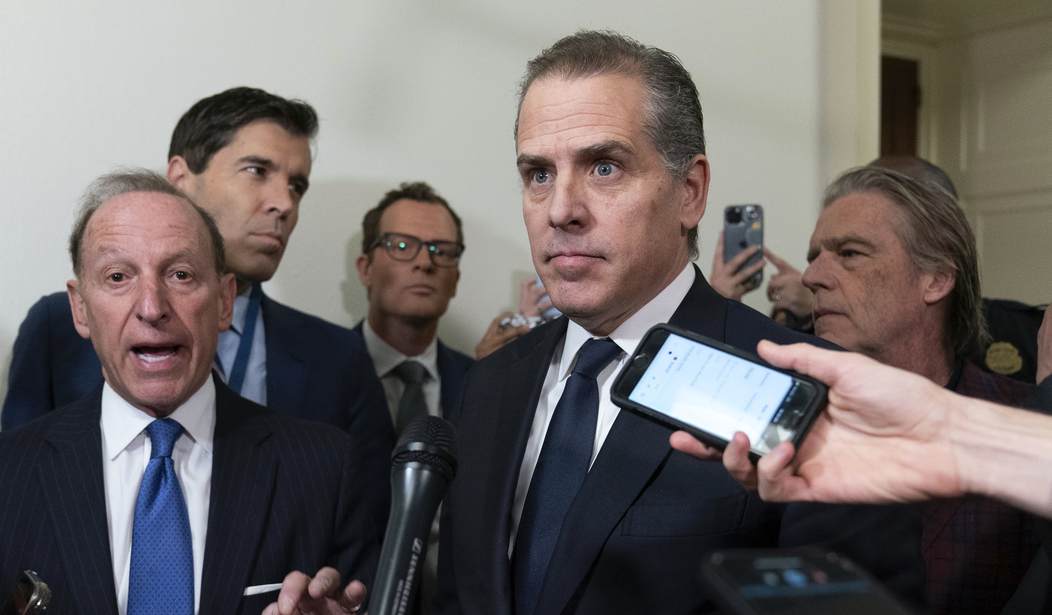On Wednesday, Hunter Biden's attorney, Abbe Lowell, argued that the tax charges filed against his client in the U.S. District Court for the Central District of California should be dismissed. Biden's legal team presented a total of eight different motions to dismiss. RedState's Managing Editor, Jennifer Van Laar, provided a rundown of that hearing.
A total of eight motions to dismiss were filed by the defense to be considered by US District Judge Mark Scarsi. They argue that the nine-count indictment should be dismissed because:
- July 2023 Diversion Agreement is in effect, therefore giving Hunter Biden immunity
- Special Counsel David Weiss was unlawfully appointed, and the prosecution violates the Appropriations Clause
- Selective and Vindictive Prosecution and Breach of Separation of Powers
- Due Process violations based on outrageous government conduct
- Improper venue
- Failure to state a claim and lack of specificity
Judge Mark Scarsi, the judge in the case, told both sides he’d make a ruling on the several petitions to dismiss by April 17.
Scarsi was quicker than anticipated. On Monday evening, he issued an 82-page Order denying all eight motions to dismiss. The full Order may be viewed below, but here are a few of the highlights.
On Biden's claim that he's immune pursuant to the Diversion Agreement:
Having found that the Diversion Agreement is a contract that binds the parties but that the parties made the Probation Officer’s signature a condition precedent to its performance, the Court turns to Defendant’s theory of immunity: that the United States’ obligation to refrain from prosecuting Defendant under section II(15) of the Diversion Agreement is currently in force. (Immunity Mot. 19–20.) It is not. The immunity provision is not one exempted from the term of the contract under the survival clause. (See Diversion Agreement §§ II(1), (15).) Thus, performance of the Government’s agreement not to prosecute Defendant is not yet due.
The Court understands that its decision rests on an interpretation of the agreement neither party advocated—that the Diversion Agreement is a binding contract but performance of its terms is not yet required. The Court, therefore, invites the parties to stipulate to further pretrial motion practice to the extent there are additional disputes that arise from the Court’s Schrödinger’s cat-esque construction of Defendant’s immunity under the Diversion Agreement.
On the claim that Special Counsel David Weiss was unlawfully appointed:
Defendant concedes in his reply that §§ 509, 510, 515, and 533 “may authorize the AG to appoint a prosecutor” but argues that a “Special Counsel” is a “term of art created by DOJ regulations.” (Appointment Reply 2.) This argument clearly places form over substance. Following Defendant’s logic, the Attorney General could have appointed Mr. Weiss “Designated Counsel” pursuant to the Attorney General’s statutory authority and 28 C.F.R. §§ 600.4–.10, and the issue Defendant complains of would disappear. That the Attorney General used the term “Special Counsel” instead of some other term similarly indicative of an independent counsel is a distinction without a difference.
On Biden's claim that the indictment is based on selective and vindictive prosecution:
As the Court stated at the hearing, Defendant filed his motion without any evidence. The motion is remarkable in that it fails to include a single declaration, exhibit, or request for judicial notice. Instead, Defendant cites portions of various Internet news sources, social media posts, and legal blogs. These citations, however, are not evidence.
...
Defendant offers only conjecture about animus motivating the prosecutorial decisions in this case. The circumstantial allegations of animus he offers are thin.
...
In the technical sense, Defendant provided virtually no evidence in support of his motion. And even if the Court credited the sources Defendant cites in support of his claims, his proffer does not rise to the rigorous standard required to justify discovery for the reasons discussed in the preceding sections.
On Biden's claim of Due Process violations based on outrageous government conduct:
Defendant focuses his argument on Shapley and Ziegler’s influence on the prosecutor’s decision to pursue tax charges. (Outrageous Conduct Mot. 19 (insisting the agents “pressured the prosecution’s hand”).) Aside from failing to substantiate his allegations that the agents influenced the prosecutorial decision with anything but speculation, Defendant offers no case in which a court exercised supervisory powers to dismiss an indictment due to conduct that impacts the fundamental decision to prosecute.
In short, Scarsi appears singularly unimpressed by the arguments proffered by Biden's legal team. The federal tax case against Hunter Biden will proceed. Currently, it is set for trial on June 20, 2024.

